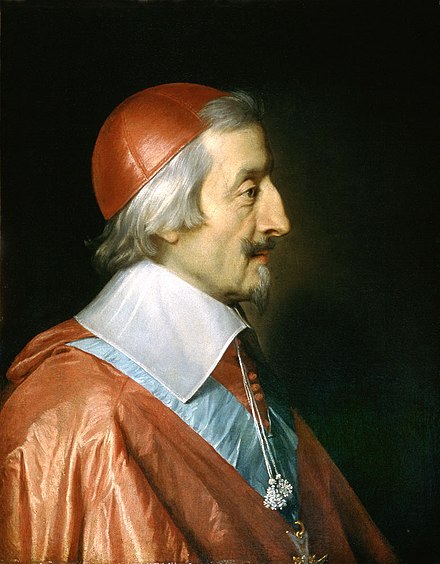Cardinal Richelieu: Founder of the Compagnie de la Nouvelle France

Life and Background
Armand Jean du Plessis, Cardinal-Duke of Richelieu and Fronsac (1585-1642), commonly known as Cardinal Richelieu, was a French clergyman and statesman who significantly shaped French history and colonial policy during the early 17th century. Born into a family of minor nobility in Paris on September 9, 1585, Richelieu rose to become King Louis XIII's chief minister in 1624, a position he held until his death.
Originally destined for a military career, he shifted to ecclesiastical studies after his older brother resigned as Bishop of Luçon. Richelieu became Bishop of Luçon in 1607 at the remarkably young age of 21, requiring a special papal dispensation due to being under the canonical age.[^1]
Rise to Power
Richelieu's political ascent began when he represented the clergy of Poitou in the Estates-General of 1614. His eloquence and administrative abilities caught the attention of Marie de Médicis, the Queen Mother, who appointed him her secretary of state in 1616. Although temporarily exiled when Marie fell from power, Richelieu skillfully maneuvered back into royal favor, becoming a cardinal in 1622 and Louis XIII's chief minister by 1624.[^2]
As the king's principal minister, Richelieu pursued three main policy objectives:
- Centralizing power in France under the monarchy
- Challenging Habsburg power in Europe
- Expanding French colonial interests overseas
Founding the Compagnie de la Nouvelle France
One of Richelieu's most significant colonial initiatives was establishing the Compagnie de la Nouvelle France (Company of One Hundred Associates) on April 29, 1627. The company, officially chartered by King Louis XIII, received a monopoly on all trade in New France and ownership of all lands claimed by France in North America.[^3]
Richelieu personally drafted much of the company's charter and became its leading member. His vision for the company included several key objectives:
- Strengthening France's presence in North America as a counterbalance to English and Spanish colonial expansion
- Establishing permanent French settlements rather than merely trading posts
- Spreading Roman Catholicism among indigenous populations
- Creating a profitable commercial enterprise through the fur trade and other resources
The charter specifically required the company to settle 4,000 French Catholics in New France over the first 15 years of its operation and to support missionary efforts among indigenous peoples.[^4]
Colonial Legacy and Vision
Richelieu viewed New France as an integral part of his broader strategy to enhance French power. He saw colonial expansion not merely as an economic venture but as a means to extend French influence globally. Under his guidance, the Compagnie de la Nouvelle France took a different approach from previous French colonial efforts, which had focused primarily on extracting resources rather than establishing permanent settlements.[^5]
However, the company faced significant challenges, including:
- Attacks by English and Iroquois forces
- Difficulties recruiting settlers willing to relocate to the harsh environment of New France
- Financial struggles despite its trade monopoly
- Ongoing conflicts with traders operating outside the company's authority
Despite these difficulties, the foundation Richelieu laid with the Compagnie de la Nouvelle France established the framework for what would eventually become a significant French presence in North America, particularly in modern-day Quebec.[^6]
Broader Historical Impact
Beyond his colonial initiatives, Richelieu is remembered for consolidating royal power in France, breaking the political power of the Huguenots (French Protestants), and establishing France as the dominant continental power through his skillful diplomacy during the Thirty Years' War.[^7]
He also founded the Académie française in 1635, which still exists today as the premier French council for matters relating to the French language.
Richelieu died on December 4, 1642, leaving behind a transformed France that was more centralized and positioned as Europe's leading power. His colonial policies, including the establishment of the Compagnie de la Nouvelle France, laid the groundwork for French imperial ambitions that would continue to shape North American history for more than a century after his death.[^8]
References
[^1]: Bergin, Joseph. Cardinal Richelieu: Power and the Pursuit of Wealth. Yale University Press, 1985, pp. 14-18.
[^2]: Treasure, Geoffrey. Richelieu and Mazarin. Routledge, 1998, pp. 32-45.
[^3]: Trudel, Marcel. The Beginnings of New France 1524-1663. McClelland and Stewart, 1973, pp. 165-167.
[^4]: Eccles, W.J. France in America. Harper & Row, 1972, pp. 28-30.
[^5]: Pritchard, James. In Search of Empire: The French in the Americas, 1670-1730. Cambridge University Press, 2004, pp. 16-19.
[^6]: Havard, Gilles and Cécile Vidal. Histoire de l'Amérique française. Flammarion, 2003, pp. 56-59.
[^7]: Church, William F. Richelieu and Reason of State. Princeton University Press, 1972, pp. 320-336.
[^8]: Knecht, Robert Jean. Richelieu. Longman, 1991, pp. 214-229.